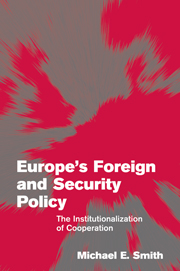Book contents
- Frontmatter
- Contents
- List of tables
- Acknowledgments
- List of abbreviations
- Introduction: foreign and security policy in the European Union
- Part I Institutions and foreign policy cooperation: the theoretical and empirical terrain
- Part II The institutionalization of cooperation
- 3 Origins: intergovernmentalism and European Political Cooperation
- 4 Information-sharing and the transgovernmental EPC network
- 5 Norms, rules, and laws in European foreign policy
- 6 Organizations and European foreign policy
- 7 Toward governance: the Common Foreign and Security Policy
- Part III Residual institutional issues
- Conclusion: beyond the CFSP: institutions, defense, and the European identity
- References
- Index
5 - Norms, rules, and laws in European foreign policy
Published online by Cambridge University Press: 21 January 2010
- Frontmatter
- Contents
- List of tables
- Acknowledgments
- List of abbreviations
- Introduction: foreign and security policy in the European Union
- Part I Institutions and foreign policy cooperation: the theoretical and empirical terrain
- Part II The institutionalization of cooperation
- 3 Origins: intergovernmentalism and European Political Cooperation
- 4 Information-sharing and the transgovernmental EPC network
- 5 Norms, rules, and laws in European foreign policy
- 6 Organizations and European foreign policy
- 7 Toward governance: the Common Foreign and Security Policy
- Part III Residual institutional issues
- Conclusion: beyond the CFSP: institutions, defense, and the European identity
- References
- Index
Summary
The Luxembourg and Copenhagen Reports clearly laid the foundations for intensive information-sharing about foreign policy among EU member states. Yet we can say much more about the relationship between institutionalized communication and international cooperation than those who view cooperation as one-shot deals or quid pro quo contracts. When patterns of communication persist and become increasingly complex and dense, whether by accident or design, the demand for common standards of behavior may grow as actors continue to engage one another. The emergence of these standards, or norms, takes collective behavior to a higher level of institutionalization by translating general values or ideas into specific behavior patterns. In the case of EU foreign policy, norms helped EPC progress from a passive forum or talking shop to a more active, collective, foreign policymaking mechanism. This occurred despite the fact that EU governments continued to claim the right to maintain their sovereignty and flexibility over foreign policy and often rejected the formal legalization of their cooperation in this domain.
The specific processes involved in this transition are the subject of this chapter. As I proposed in Chapter 2, norm development can be conceived in terms of several steps: (1) the emergence of informal (uncodified) customs, or the (often unspoken) traditions and practices that emerged in day-to-day interactions among EPC officials; (2) the codification or ordering of these informal customs into explicit, written norms; (3) the transition from explicit norms to rules (rights and obligations), as reflected in EPC reports; and (4) the transition from rules into formal laws (legal rules), which involve behavioral and legal obligations.
- Type
- Chapter
- Information
- Europe's Foreign and Security PolicyThe Institutionalization of Cooperation, pp. 117 - 144Publisher: Cambridge University PressPrint publication year: 2003



